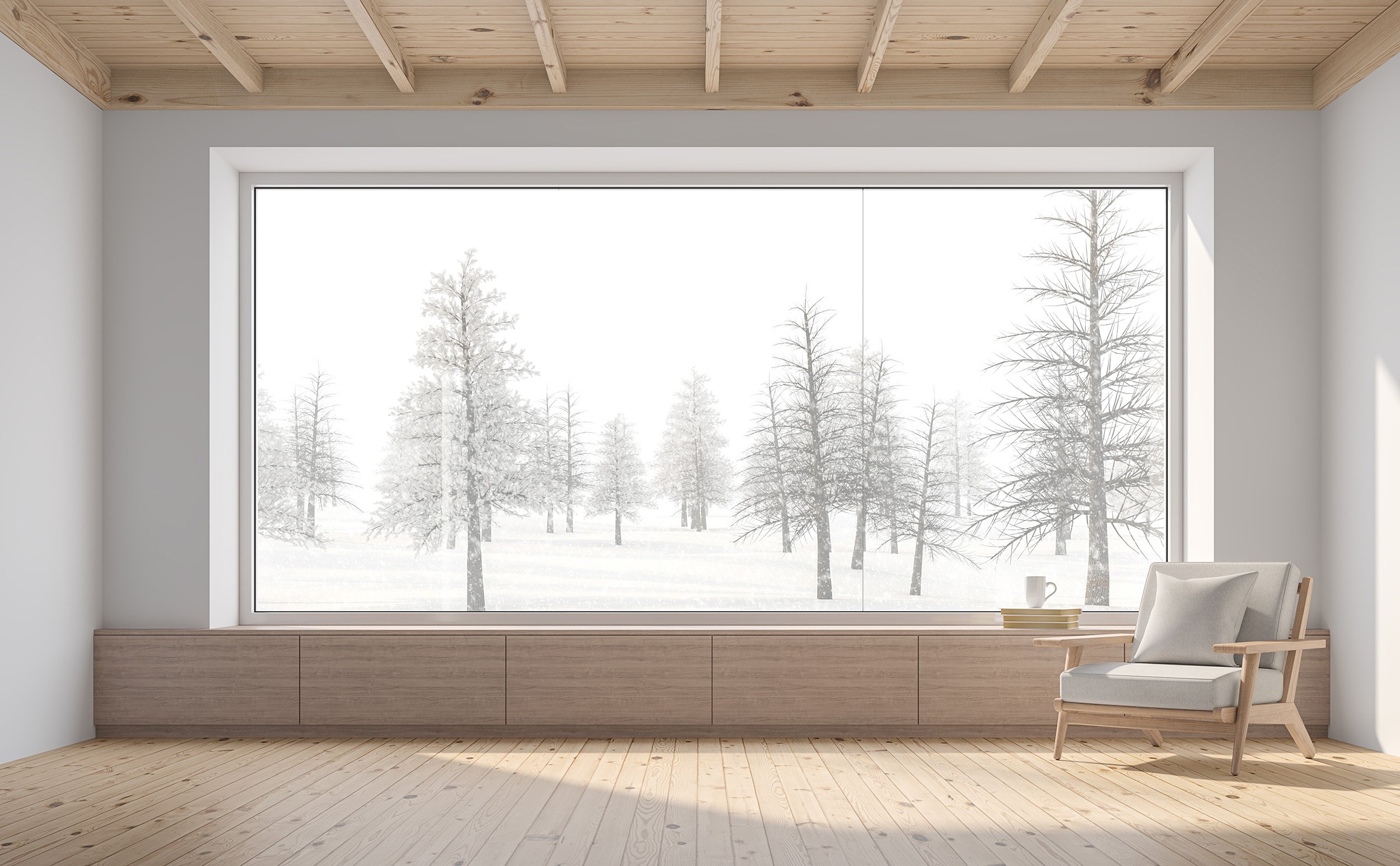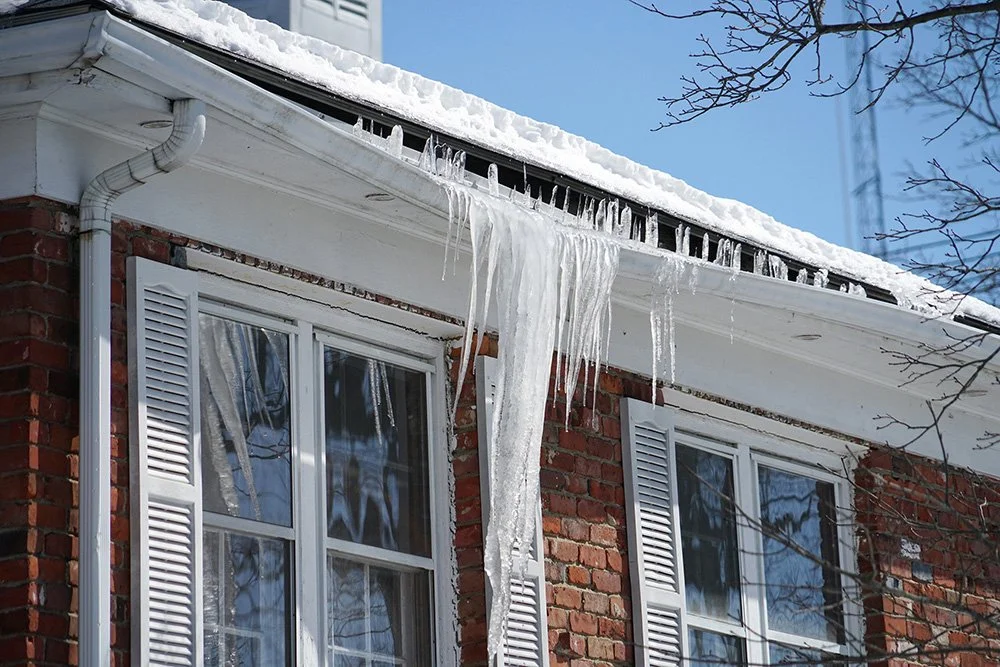Winter Home Maintenance Checklist

Winter can be especially tough on a home. Heavy snow and ice can strain your gutters, your heating system kicks into overdrive, and your internal plumbing chills into pipesicles.
To avoid some seriously major catastrophes, read on to learn about our best winter tips for homeowners and stay prepared with our winter home maintenance checklist.
1. Furnace & Heating Systems Check
—
Most modern homes across the US today use either a natural gas or electric furnace providing centralized heating throughout the home by way of air ducts, radiators, or vent systems.
A furnace is the heating component of your home’s HVAC system, or Heating Ventilation and Air Conditioning System, and is a complex major system within your home requiring special attention and regular preventative maintenance to perform efficiently and effectively. Ideally, homeowners should check their furnaces before the first cold snap of the year. To do this, turn your thermostat up to 90 degrees to see if it kicks on right away. If there’s no hot air coming out after several minutes, there are numerous things that can be checked to troubleshoot potential problems. If you haven’t checked or changed your air filter recently, this is the first and easiest place to begin. A dirty filter can inhibit airflow and prevent the furnace from starting.
Other common problems for furnace malfunctions include clogged drain lines, dirty ductwork, broken blowers or starting mechanisms, cracked heat exchangers, bad limit switches, ignition problems, worn belts, and the list goes on. Since your furnace is such an integral part of your home’s function, it’s best to hire an experienced HVAC specialist to diagnose and repair any issues. Many heating system problems can be staved off with regular preventative maintenance, which often saves homeowners more money in the long run by addressing any issues before something actually breaks down. Alternatives to gas and electric central heating systems include solar systems, ductless mini-splits, geothermal heating, radiant heating, propane, heating oil, wood-burning stoves, space heaters, and passive house principles.
Some homeowners use a unique combination of heating systems to warm their homes, and as a result, require more specialized service professionals to check and maintain their systems in advance of winter. If you plan to use your fireplace or chimney at all during the winter, even if it’s not your primary heat source, it’s important to have it cleaned and inspected by a chimney sweep to check for blockages and any potential creosote buildup. Creosote is a tar-like mixture of chemicals that can line the inside of your chimney and can cause chimney fires, which can ultimately lead to house fires. Good news is, the build-up of creosote is largely preventable by using creosote remover, a product you can purchase and dust onto your hot coals.
Need help checking your furnace? Preventative maintenance for your furnace is part of any good home concierge service plan.
2. Check Your Insulation
—
Including Windows and Doors!
For homeowners with skyrocketing heating costs, it can be beneficial to investigate whether the home has adequate insulation. Without effective insulation, which also encompasses doors and windows, heat can easily escape through the roof and any other gaps in door frames and window casings making for massive heat loss along with added energy costs.
As a double whammy, inadequate insulation can cause your furnace to kick into overdrive, running continuously and causing parts to wear out and break down faster.
If you’re new to your home or if you’d just like to see whether you can reduce your heating costs, consult with a contractor, handyman, or your home concierge to evaluate your home’s insulation within the attic while also sealing up any drafty leaks around windows and doors.
This can go a long way in preventing your furnace and other heating systems from working harder than they need to while also increasing the longevity of these systems, which in turn protects the overall value of your home. A cheaper energy bill is pretty great too.
What is a Home concierge?
A new service offering for homeowners is popping up all across the US. What is it, and is it right for you? As a leading provider of home concierge services in Colorado, we’re sharing what to know about this new trend in home maintenance.
3. Check Your Roof
—
Inspecting your roof, including identifying any damaged or missing shingles and replacing them before a major snowfall (and subsequent snow melt), is a great way to ensure you won’t have any water leaking into your home during the winter months.
It can be challenging to conduct a roof inspection while there’s snow on your roof, so evaluating the entire area before the snow arrives is definitely the easier approach.
A roof that’s in tip-top condition can boost the overall value of your home, and preventative maintenance is one way to keep it that way.
4. Clean Your Gutters
—
Throughout all times of the year gutters can become clogged with leaves or other debris which can lead to water failing to drain properly through the gutter system, often overflowing into your home. This is especially compounded in the winter. As the temperature drops, if water can’t drain, the water will then pool and collect in the gutter, often freezing into an ice dam. Essentially, a big hunk of ice lodged in your gutter, ice dams can put tremendous strain on the gutters, causing them to buckle and crack under the weight of the ice. This will cause further problems down the line, as water will begin to leak out from areas where it shouldn’t and often enter the house. Further, ice dams often produce icicles. While very pretty, icicles place even greater pressure on the gutters and can tear away shingles, soffits, or fascia boards.
Make sure your gutters are clear both before and during winter. Heated cables can be used to prevent ice dams, but if one has already formed, applying a de-icing agent can speed up the melting process.
If you’ve never heard of a home concierge service, getting on a monthly service plan can be a great way to take care of this and any other seasonal maintenance.
5. Protect Your Pipes
—
When temperatures dip below freezing, your home’s pipes can become at risk of freezing and ultimately breaking. To clarify, it’s not really the pipes that freeze but the water within them. When this happens, the water expands and can cause the pipe itself to stretch and crack, often resulting in water damage within the walls. Water damage by freezing pipes is one of the most common insurance claims for homeowners each year. Thankfully, there are some simple strategies to help prevent freezing pipes.
Start by turning off and draining any outside faucets and water lines, such as sprinklers and hose bibs. Inside the home, insulate any exposed pipes with self-regulating heating cable or wrap pipes with foam pipe insulation. Dripping faucets and opening cabinet doors during subfreezing temperatures can also help keep pipes warm and prevent water freezing. It’s also critical to keep the internal temperature of your home at around 55 degrees Fahrenheit at a minimum. So if you’re traveling, be sure to keep your heating system on. If you don’t have a centralized heating system, it will be significantly more labor-intensive to ensure a constant temperature. Ask a family member to house-sit to monitor alternative heating systems while you’re away.
6. Be Prepared for Power Outages
—
When winter hits, it can be extremely reassuring to have an abundance of food, water, and emergency supplies in case your home loses electricity for an extended period. Non-perishable meals, bottled water, extra batteries, and even some basic camping gear such as a cold-rated sleeping bag can go a long way in keeping you safe and warm. Generators and space heaters make great backups for a whole house power loss.
Willow is a luxury home concierge service based in Boulder, Colorado. We care about your home and giving you back your time to do the things you care about most.
How it Works



